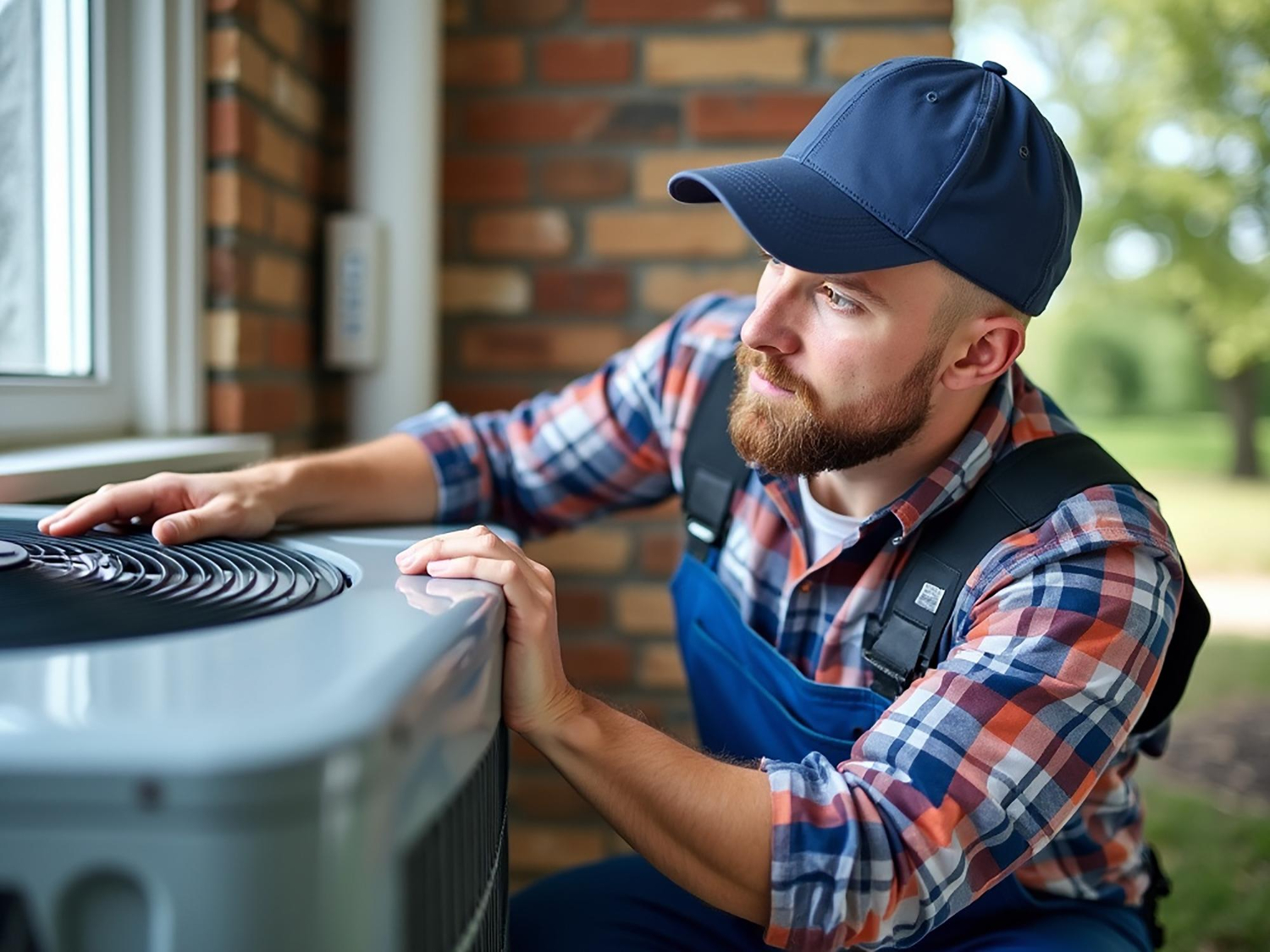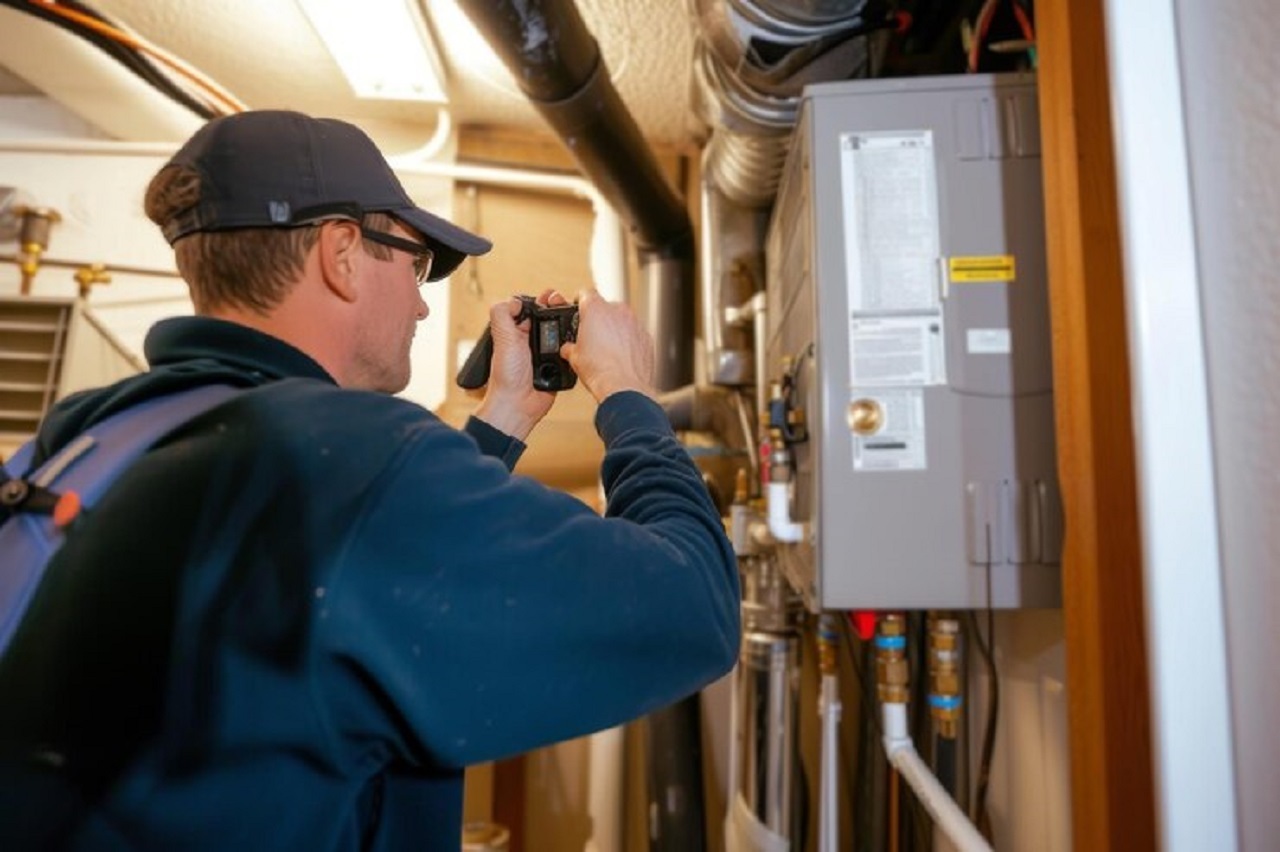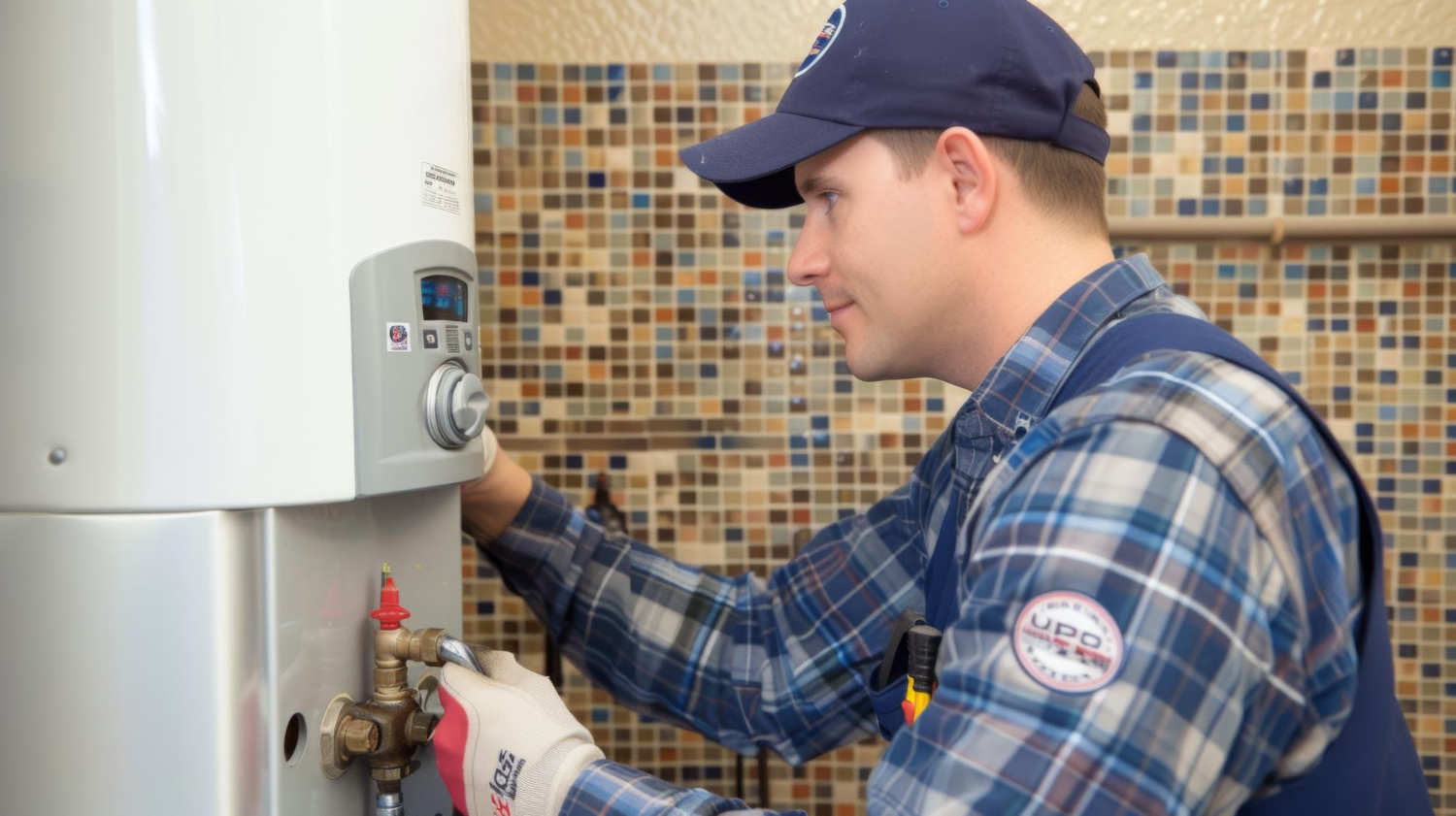What Is HVAC? All You Need to Know
Do you often turn the heat up or down in your home and need help understanding how it works? You’ve heard of HVAC before, but you probably don’t know what it means or how it functions exactly. Let’s take a deep dive into this essential part of our homes.
In this article, we’ll look at what HVAC is – its history, components, and why it is essential in keeping us comfortable year-round. Read on to learn all you need to know about HVAC.
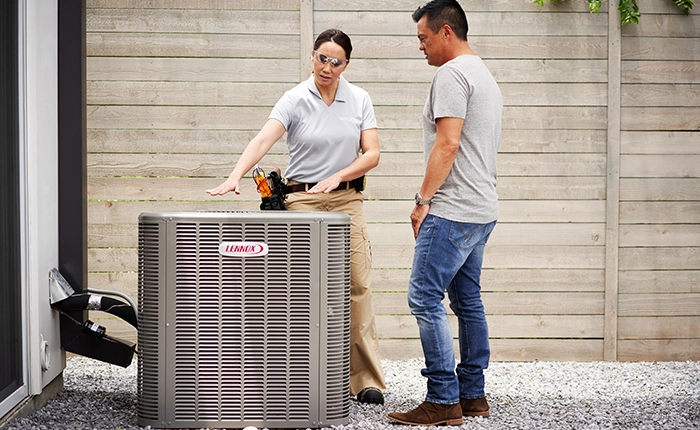
What is HVAC?
If you’ve ever been curious about what HVAC’s definition is, the answer is simple: HVAC stands for Heating, Ventilation, and Air Conditioning systems designed to control the air quality and temperature in indoor spaces. Used in commercial and residential buildings, HVAC systems keep us comfortable no matter what’s the weather outside. Without this vital system, the inside of our homes or offices would often be sweltering in summer, freezing in winter, and have poor air quality.
Depending on the size of your building, you may have a simple or complex system. A basic residential HVAC system typically consists of four components – an outdoor, an indoor unit, ductwork, and a thermostat — all working together to keep us comfortable all year round.

How Does HVAC Work?
Typically, most homes use what is called a “combined system” that includes central heating and air conditioning. In this type of setup, each component works together to achieve heating and cooling as desired. In some cases, the components may even be zoned and operate independently of each other to achieve precise temperature control depending on indoor usage or occupancy needs in different areas of the home.
What Are the Main Components of an HVAC System?
Do you ask yourself, “Is HVAC air conditioning?” HVAC services include air conditioners, but not just that. So, it is important to understand all the components of an HVAC system. Here’s a quick rundown of standard components found in HVAC systems:
- Furnace: Furnaces generate warmth by burning natural gas or propane and then swiftly circulate this heat throughout your home to raise its temperature.
- Heat Pump: Contrary to popular belief, a heat pump can be an excellent efficient way of heating and cooling your home or business. The refrigerant used by heat pumps can absorb, transport, and release large amounts of heat very quickly – plus, this flow can be reversed depending on whether you need heating or cooling. Unlike most other options like gas furnaces, heat pumps are powered solely by electricity, not fossil fuels, and are therefore considered a green alternative to gas furnaces.
- Air Conditioner: Air Conditioners capture indoor heat and discharge this heat outdoors through mechanical means. By moving hot air over the cold indoor coil (picture it like a radiator) water condenses on the cold surfaces of the coil and humidity is removed from the air. This process dehumidifies the air and ensures that the home does not feel ‘clammy’ or ‘swampy’.
- Ductwork: Ductwork is a network of ducts that distribute air from sources such as your furnace, air conditioner, and heat pump. You can picture the ductwork like ‘vanes’ and arteries that deliver and return the conditioned air.
- Thermostat: The thermostat is a vital part of any HVAC system. It automates the run times of the comfort system based on personal humidity and temperature preferences.
- Air Handler: Air handlers are typically the indoor component of heat pump systems. An air handler consists of a blower motor, which moves the air through your duct system, and an evaporator coil. Air handlers can be ducted or non-ducted depending on the application.
Additional HVAC Components
- Humidifiers
- Dehumidifiers
- ERV/HRV
- Zoning Systems
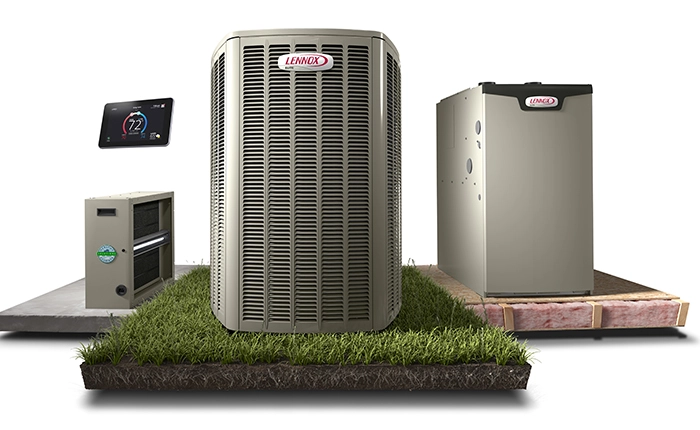
Why is HVAC Important?
HVAC systems are essential to keeping us comfortable in our homes, businesses, and offices, regardless of the weather outside. Without them, indoor environments would be much more challenging to maintain. Here are a few of the essential benefits of having an HVAC system:
- Keeping Temperatures Consistent: HVAC systems make it easy to keep indoor temperatures comfortable all year round.
- Keeping the Humidity Right: Humidity control is an integral part of an HVAC comfort system
- Improving Air Quality: Properly maintained HVAC systems can help enhance air quality by filtering out dust, pollen, and other allergens from the air.
- Lowering Energy Bills: An efficient and well-maintained HVAC system can help achieve bigger savings over time due to its energy efficiency capacities, allowing you to save money on electricity bills and use less power.
- Increasing Productivity: Working in a comfortable environment can help increase productivity.
When Was HVAC Invented?
In 1902, Willis Haviland Carrier, also known as “The Father of the Air Conditioner,” revolutionized the home industry by inventing the first modern air conditioning system. Carrier, a skilled engineer, developed his groundbreaking system at a printing plant in Brooklyn, NY, after seeking to control humidity levels.
To do this, he used principles of mechanical refrigeration to direct air through special coils filled with cold water, cooling the space and lowering humidity levels. This invention forever changed how people controlled temperature and humidity indoors and started a new heating, ventilation, and air conditioning industry.
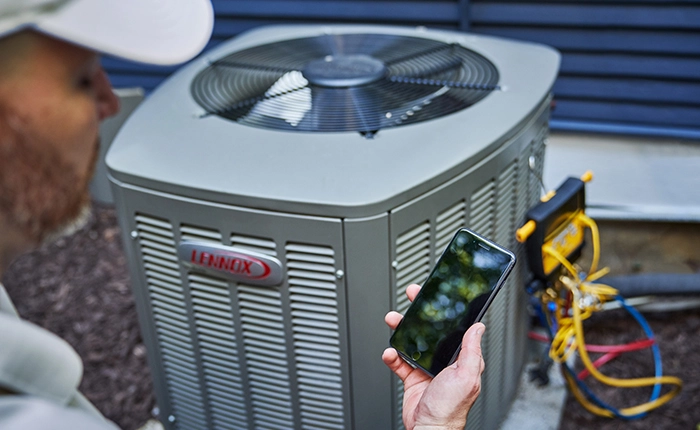
What is the Right HVAC System for Me?
The most suitable HVAC system for you depends on your individual needs and preferences. If you live in a mild climate, an air conditioner or heat pump may be the best option for your home. However, if you experience extreme temperatures throughout the year, a combination of a furnace and an air conditioner might be the ideal choice. Consult a qualified HVAC technician to properly advise and explain HVAC options for you and your home. Read about the most common types of HVAC systems.
How Does Air Conditioning Work?
Air conditioning systems operate on the principle of refrigeration. They remove heat from an enclosed space and transfer it outside, resulting in cooler indoor temperatures. The process involves four main components: a compressor, condenser coil, evaporator coil, and expansion valve. The compressor pressurizes the refrigerant gas and raises its temperature before sending it into the condenser coil located outside the building. As it passes through the condenser coil, heat is released into the outdoor environment. Next up is the cooled refrigerant entering your home or office’s evaporator coil where it absorbs heat from indoor air as it evaporates into a low-pressure gas form again. A fan system called an air handler then blows warm air over this cold evaporator coil. Finally, after absorbing heat from indoors and effectively cooling down your living or working space, this low-pressure gas returns to the compressor for another cycle.
Key Features To Why Is Air Conditioning Important For Maintaining Indoor Comfort?
Air conditioning offers more than just cooling down spaces during hot weather conditions; it helps maintain optimal humidity levels that prevent mold growth while protecting furniture from damage caused by excessive moisture.
Modern AC units often come with built-in filtration systems that improve indoor air quality by removing dust particles and allergens such as pollen or pet dander – particularly beneficial for individuals with respiratory issues or allergies. Proper ventilation through an efficient HVAC system ensures fresh airflow throughout your home or office while reducing odors caused by stagnant air.
Key Features To Look For In An Air Conditioning System
Choosing the right air conditioning system is crucial for optimal performance and comfort. Consider the following key features:
- Energy Efficiency: Look for units with a high SEER (Seasonal Energy Efficiency Ratio) rating to reduce electricity consumption and lower utility bills.
- Size and Capacity: Choose an appropriately sized system to ensure efficient cooling without excessive wear and tear.
- Noise Level Considerations: Opt for models with lower dB ratings for quieter operation.
- Maintenance and Durability: Select systems with easily accessible filters and components designed for easy cleaning or replacement.
- Cost Considerations: Consider both upfront and long-term operating costs to find the right balance between affordability and energy savings.
By considering these key features, you can ensure efficient cooling, durability, and optimal comfort for years to come – all while saving on energy costs!
Cost Considerations For Air Conditioning Systems
When choosing an air conditioning system, it’s important to consider both the initial purchase cost and the long-term operating expenses. Here are some key points to keep in mind:
- Initial Purchase Cost vs. Long-Term Operating Cost: Investing in an energy-efficient model may have a higher upfront cost but can lead to significant savings on energy bills over time.
- Potential for Energy Savings with High-Efficiency Models: Look for units with high SEER ratings to reduce energy consumption and save money in the long run.
- Importance of Professional Installation in Overall Cost: Proper installation ensures optimal performance and avoids costly issues down the line.
- Financing Options: Explore financing options offered by manufacturers or local HVAC companies to make the upfront cost more manageable.
- Maintenance and Repair Costs: Regular maintenance and prompt repairs can help prevent costly breakdowns and extend the lifespan of your system.
By carefully considering these factors, you can make an informed decision about which air conditioning system best fits your needs and budget. Remember to consult with a professional HVAC technician who can provide personalized advice based on your specific requirements.
Maintaining Your Air Conditioning System
Regular maintenance is essential for keeping your air conditioning system running smoothly. Here are some key points to remember:
- Importance of Regular Maintenance: Regular maintenance prevents breakdowns, improves energy efficiency, and extends the lifespan of your unit.
- Basic Maintenance Tasks You Can Do Yourself: Clean or replace filters, clear debris from around the outdoor unit, and keep vents unobstructed.
- When to Call a Professional for Service: Contact a professional HVAC technician if you notice unusual noises, decreased cooling performance, leaks, or strange odors.
By scheduling regular maintenance with a qualified technician, you’ll ensure that potential problems are identified early on and addressed promptly.
Key Takeaways
To conclude, we can define HVAC as a system of multiple components working together to provide an environment with heating, cooling, ventilation, and air conditioning. A properly designed and installed HVAC comfort system can provide significant energy savings and can increase productivity in your home, office, or business.
If you’re looking to upgrade or install an HVAC system, it’s important to consult with a reputable HVAC contractor to ensure you get the right system for your individual needs.
The HVAC company that stands out in and around Orange County is Haven Air Conditioning!
Do you want to learn more about HVAC? Read our guides below:



